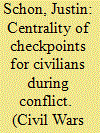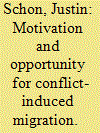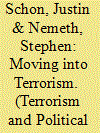|
|
|
Sort Order |
|
|
|
Items / Page
|
|
|
|
|
|
|
| Srl | Item |
| 1 |
ID:
147529


|
|
|
|
|
| Summary/Abstract |
Analyses of the violence–displacement relationship motivate a disaggregation of violence into violence in residential areas (home violence) and violence along migration routes (road violence). These two forms of violence have opposite effects upon displacement, with home violence increasing displacement and road violence decreasing displacement. Yet, conflict scholarship would benefit from additional consideration of the specific activities that constitute road violence. This consideration reveals that road violence primarily involves displacement-deterring violence at checkpoints. This motivates the question: How does checkpoint violence deter displacement? Using interviews with Syrian and Somali refugees, as well as daily data on violence and displacement in Somalia, this paper argues that state and non-state armed groups create and foster uncertainty at checkpoints. Then, they use dramatic violence that is tangible to civilians through their ability to physically see, hear, and smell evidence of it as propaganda. As propaganda, the deterrent effect of checkpoint violence is amplified beyond isolated violent events. More broadly, results from quantitative analysis of the daily data on violence and displacement in Somalia indicate that uncertainty about road violence (road uncertainty) and uncertainty about home violence (home uncertainty) amplify the effects of road violence and home violence, respectively.
|
|
|
|
|
|
|
|
|
|
|
|
|
|
|
|
| 2 |
ID:
178984


|
|
|
|
|
| Summary/Abstract |
Armed conflict creates a context of high uncertainty and risk, where accurate and verifiable information is extremely difficult to find. This is a prime environment for unverified information—rumors—to spread. Meanwhile, there is insufficient understanding of exactly how rumor transmission occurs within conflict zones. I address this with an examination of the mechanisms through which people evaluate new information. Building on findings from research on motivated reasoning, I argue that elite-driven narrative contests—competitions between elites to define how civilians should understand conflict—increase the difficulty of distinguishing fact from fiction. Civilians respond by attempting thorough evaluations of new information that they hope will allow them to distinguish evidence from narratives. These evaluations tend to involve some combination of self-evaluation, evaluation of the source, and collective sense-making. I examine this argument using over 200 interviews with Syrian refugees conducted in Jordan and Turkey. My findings indicate that people are usually unable to effectively distinguish evidence from narratives, so narrative contests are powerful drivers of rumor evaluation. Still, civilian mechanisms of rumor evaluation do constrain what propaganda elites can spread. These findings contribute to research on civil war, narrative formation, and information diffusion.
|
|
|
|
|
|
|
|
|
|
|
|
|
|
|
|
| 3 |
ID:
164552


|
|
|
|
|
| Summary/Abstract |
How do civilians decide when to leave their homes during conflict? Existing research emphasizes the role of violence in driving civilian migration decisions. Yet, migration timing often does not correspond with the timing of violence. To explain this discrepancy, I argue that violence fits within broader considerations of motivation and opportunity to migrate. Witnessing violence triggers post-traumatic growth that delays narrative ruptures and the subsequent migration that they motivate. Civilians who have ‘wasta’ – an advantaged social position resulting from some combination of money and connections – have the opportunity to migrate safely. Civilians who possess both motivation and opportunity migrate earlier. I use over 170 structured interviews with Syrian refugees in Turkey to test this argument. Descriptively, respondents who did not witness violence (early motivation) left their homes seven months earlier, on average. Respondents with wasta (opportunity) left their homes one full year earlier, on average. Respondents who both did not witness violence (early motivation) and had wasta left their homes approximately one and a half years earlier, on average. Cox proportional hazard models reveal that respondents only migrated earlier in the conflict if they had both early motivation and opportunity. Open-ended responses from the interviews support the quantitative results and help explain their causal mechanisms. These findings contribute to understandings of conflict-induced migration, civil war, and the Syrian conflict.
|
|
|
|
|
|
|
|
|
|
|
|
|
|
|
|
| 4 |
ID:
188060


|
|
|
|
|
| Summary/Abstract |
How can we expect climate change to affect terrorism? Research on climate-conflict links argues that climate and conflict are unlikely to exhibit a direct relationship. Instead, these links are likely to be indirect, often through negative shocks to agriculture. Even then, politics remains a far stronger influence on conflict than climate. Terrorism appears particularly unlikely to be directly linked to climate change, since climate change disproportionately affects rural areas and terrorism disproportionately affects urban areas. Yet, we argue that there is a process through which climate change could increase the risk of terrorism. This process involves failure to adapt in rural areas, rural-urban migration, and then a failure of cities to incorporate new population influxes. Meanwhile, rural-urban migration is likely to trigger path-dependent urbanization processes that will increase the share of the world’s population living near country borders. We expect this process to increase the motivation and opportunity for terrorism as climate change continues. Policies that help rural areas adapt through new livelihood strategies and cities adapt to large population influxes are critical to reducing this threat.
|
|
|
|
|
|
|
|
|
|
|
|
|
|
|
|
|
|
|
|
|